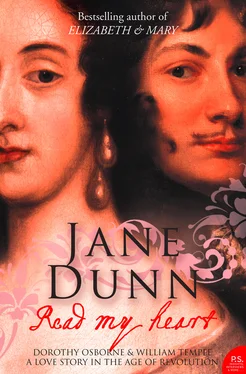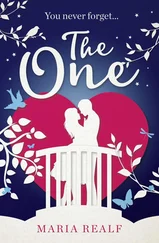As Robin made his escape and ran back to where his sister, and most likely William Temple too, was waiting he was seized by the authorities and the youthful party were taken before the governor. That summer the parliamentary forces guarding the island were particularly suspicious and quick to react, having been alerted to the fact that their royal prisoner had already attempted two abortive escapes from their custody: in this febrile atmosphere these foolhardy young people were in danger of imprisonment, if not of actually being shot.
It was not only William’s relations who seemed to be influential on the island, however, for Dorothy and Robin also had a close kinsman, Richard Osborne, living in the castle as Charles I’s gentleman-of-the-bedchamber. He was implicated in at least one of the harebrained plots for the king’s escape, and the family connection may well have added further reason for their father’s exile in St Malo. The Osbornes were becoming known as royalist troublemakers. Little wonder then that this young Osborne’s appearance before a hard-pressed governor, confronted with his personally insulting and seditious graffiti, was not treated as a youthful prank.
Robin was one year older than Dorothy but she was the quicker witted and more judicious. As her brother was charged, Dorothy confounded all by stepping forward and claiming the offence as her own. This took a certain courage given her avowed dislike of drawing attention to herself and her almost pathological fear of inviting others’ scorn. It was also a dangerous time to admit to royalist affiliation expressed in such a threatening analogy. But Dorothy may not have just been impetuously protective of her brother, she may have hoped too that natural chivalry and social prejudices would work in their favour. Men were held responsible for the politics of a family and this meant women, like children, should not be punished for political crimes, their opinions considered the responsibility of their husbands and fathers.
Perhaps it was not just the governor’s reluctance to charge a woman that saved Dorothy and her brother: the fact that her new friend happened to be Governor Hammond’s cousin might have brought some influence to bear on the case. Almost certainly William was present when the Osbornes were arrested. His sister Martha remembered his report of this incident and how impressed he was with Dorothy’s spirited action: she considered this the moment when William committed his heart. The unfolding national drama and their own sense of shared danger had inflamed their youthful spirits into a passion grand enough to withstand anything. From that point William and Dorothy chose a lengthy and difficult path that became an epic tale in itself: ‘In this Journey began an amour between Sr W T and Mrs Osborne of wch the accidents for seven years might make a History.’ 12
Dorothy and her brother were free to continue their journey to France, now with heightened spirits, having with ingenuity escaped punishment, even death. They were joined by William whose easy talk and dashing good looks transformed the whole expedition. On the journey to St Malo the boat either passed near Herm, or Dorothy and William made a later expedition to it. One of the smallest Channel Islands, or Les Iles de la Manche as they were still known, it was then home to deer and rabbits, its coast a haven for smugglers, pirates and seabirds. The sight there of an isolated cottage caught the romantic imaginations of both young people: a few years later Dorothy reminded William, at a time when she was longing to escape with him the constraints of their more mundane world: ‘Doe you remember Arme [Herm] and the little house there[?] shall we goe thither[?] that’s next to being out of the world[.] there wee might live like Baucis and Philemon, * grow old together in our little Cottage and for our Charrity to some shipwrakt stranger obtaine the blessing of dyeing both at the same time.’ 13
Ovid’s story of these two lovers had particularly affected Dorothy who admitted to William that she cried the first time she read it in the Metamorphoses. She thought this the most satisfying of Ovid’s stories and identified with ‘the perfectest Characters of a con[ten]ted marriage where Piety and Love were all there wealth’. 14 Perhaps as she was reunited in St Malo with her broken and dispossessed father she was reminded of how, like him, the gods, whom Baucis and Philemon had sheltered, had first been denied help by those from whom it was most due. She and her mother too had had doors closed against them in their desperate attempts to get food and supplies through to Sir Peter and his garrison. In her sense of abandonment she might have felt like Ovid’s gods ‘ mille domos clausere serae 15 [a thousand homes were barred against them]’.
Already emotionally committed to Dorothy, William stayed on with her and the Osborne family for at least a month, delaying his departure on the rest of his European tour. Dorothy was to write to him later that his frankness and his good nature were his most attractive qualities: ‘twas the first thing I liked in you, and without it I should nere have lik[ed] any thing’. Good nature was thought by some to be the sign of a simple nature, she thought, ‘credulous, apt to bee abused’, but Dorothy would always rather they both erred that way than became cynical and two-faced: ‘People that have noe good Nature, and those are the person’s I have ever observed to bee fullest of tricks, little ugly plotts, and design’s, unnecessary disguises, and mean Cunnings; which are the basest quality’s in the whole worlde.’ 16 This honesty and plain speaking was something they both shared, a quality that was not necessarily appreciated, in a woman at least. ‘Often I have bin told,’ Dorothy wrote to William later, ‘that I had too much franchise in my humor [frankness in my disposition] and that ’twas a point of good breeding to disguise handsomly.’ 17 Dorothy’s excuse was that such discretion could hardly be expected from someone who had been isolated from court life since she was a child.
During this month of close company and constant conversation Dorothy and William discovered a rare compatibility: ‘his thoughts mett with hers as indeed they could not choos, since they had both but one heart,’ he added in one of his personalised romances written specially for her. It is most likely that it was William who first declared his feelings. He was of a more impetuous and immediately expressive nature: his sister described him as having ‘passions naturaly warme, & quick, but temper’d by reason & thought’. 18 Dorothy anyway was horrified at the idea of a woman courting a man and objected to fictions where this was made to happen: ‘It will never enter into my head that tis possible any woman can Love where she is not first Loved.’ 19
Dorothy noticed that they had a similar recipe for contentment, possibly highlighted by their mutual response to the dream of living like Philemon and Baucis in their island retreat: ‘only you and I agree,’ she wrote later, ‘[contentment] tis to bee found by us in a True friend, * a moderat fortune, and a retired life’. 20 This sense of destiny, made more intense by their youth (they were both just over twenty), would arm them against the pain of separation and frustration of their desires that they endured in the long years to come. The unusualness for the time of their dogged resistance to their parents’ wishes and their obstinate insistence on the pursuit of love also spoke of their own romantic temperaments and the extraordinary power of their clandestine letters to each other. These alone, through periods of extended separation and family harassment, were all they had to keep the flame alive and bolster each other’s belief in the possibility of marriage and consummation at last. ‘Read my heart,’ Dorothy wrote in one of her letters and that heartfelt quality is just what gave them such compelling force, for they carried all her intelligence, humour and longing for William in their separate exiles.
Читать дальше












